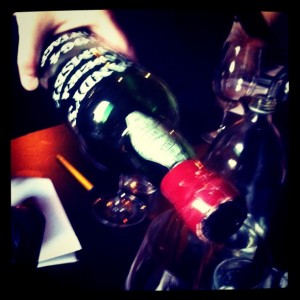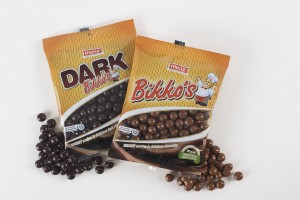
Yesterday I attended my first Sommeliers Australia event, Madeira Madness. I wasn’t really sure what to expect, but was hoping for a fairly structured, tutored tasting – and that is exactly what I got.
Between 20 and 30 people congregated upstairs at Est Pizzeria on East Terrace for a session led by James Godfrey and Phil Reedman MW. James is a Senior Winemaker at Treasury Wine Estates with plenty of experience making fortifieds in Australia and Phil runs his own consulting company. Phil had just returned from the UK where he had sourced some of our tasting samples.
We began with an overview of Madeira – both the island and the wine – and started on the tasting quite promptly. The four ‘noble’* Madeiran grape varieties are Sercial, Verdelho, Boal (or Bual) and Malmsey. This is also the order of increasing sweetness. So don’t think about what your grandma used to have stashed in the cupboard: a Sercial Madeira is almost bone dry!
The tasting started with four (one of each of the above grapes) non vintage Madeiras from Henriques & Henriques. My favourite was the Sercial – absolutely ideal aperitif material. Not overly complex – think raisins, caramel, sweet and hot spices, and finishing with some definite nut characteristics (for me, that was hazelnut). The really standout thing in this wine was some really really high acidity. It really cleared the palate and allowed the individual flavours to shine.
We then tasted some older wines – the oldest being a 1964 Blandy’s Malmsey and the youngest being a 1988 D’Oliveira Colheita Terrantez. These wines were all considerably more complex than the first four – so there was a lot of discussion and a lot of note taking! My personal favourite was the 1981 D’Oliveira Colheita Verdelho which had a real coffee, caramel and fruit cake nose but tasted quite different. The searing acidity was still there but it had an almost salty taste to it, while finishing richly. The closest I could come to was salted caramel, but when James mentioned crushed pineapple that, for me, hit the nail on the head!
I was struck by how much citrus I spotted in the wines – my notes are peppered with fresh lemon, fresh lime, and lots of references to preserved lemon.
It was a great couple of hours – not only did we taste some amazing wines (and I doubt I’ll ever be in a room with 9 Madeiras again!) but having Phil and James there was very instructional. There can’t be too many people in Australia with such a solid knowledge of Madeira and fortifieds and it was fab to have them pointing out things that were both typical and atypical. Definitely an afternoon for wine geeks!
Thanks to Ali for the photo – follow him on twitter!
*In wine speak, ‘noble’ varieties are those grape varieties which produce wines of quality – typically we’re talking about greater complexity and length, and often things like potential for ageing. This frequently translates into a slightly higher priced product!

